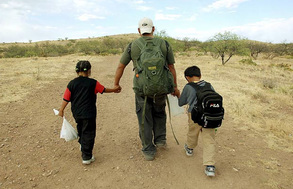
Our latest blame game involves unaccompanied minors crossing our southern border. There’s been a surge in the past months, and it’s expected to continue through the summer (coincident with the deadly desert heat). About 75% are from Central America (Guatemala, El Salvador, Honduras), and “many” (no numbers yet) have family members already residing in the US. The majority of these recently apprehended children were “guided” across the US border by traffickers (“coyotes”) for large fees. As usual, the girls and young women were raped along the way. The stories of these courageous children’s journeys are those of refugees. They left home to escape horrendous situations in their violence-ridden and corrupt countries.
In response to this crisis, pundits and politicians have cherry-picked budgetary concerns the way they do science. Faced with this new border issue, there’s an outcry about the costs of caring for the many apprehended child refugees. However, in recent years the US has spent billions to aid Syrian refugees, and additional billions to support refugee camps in Africa and Asia. We’ve heard little criticism and certainly no outrage about expenditures to help those fleeing violence and famine on other continents.
While it is tempting to blame the children and their families for this latest immigration “situation,” it’s also extremely unfair. Regardless of the hopes and perceived promises of a better life in the US, no one would stridently elect for their child to travel alone from Central America to the US border. Only absolute desperation would drive such an extreme decision. Let’s be reasonable in viewing this.
This is indeed quite the mess, but perhaps an enlightening one. As the Christian Science Monitor suggested, I insist that this crisis requires serious reflection on our foreign policy priorities, and some long due attention to our neighbors. Why don’t we invest in the kids next door (Mexico) and those down the street (Central America) if we want our neighborhood to be safe and secure? Take a look at where the US invests in foreign assistance and note how little of it goes to our walking-distance community.
We have a deplorable history with Latin America overall, and little long-term positive impact to show for it. In general, our interventions have increased poverty (particularly for indigenous peoples) and corruption, while increasing violence and instability. To help Mexico, we maintain a consumer base for illicit drugs and provide weapons for the cartels to terrorize Mexican communities. We deliver huge amounts of funding to combat the drug trafficking we support, and that subsequently lines the pockets of the corrupt. And let’s not forget the blessings of NAFTA, which continue to decrease opportunities for the working poor in Mexico and beyond. As for Central America, we apparently have little interest in those nations’ current struggles, despite civil wars and unstable governments. Honduras has the highest murder rate in the world. The indigenous majority in Guatemala is locked into chronic poverty as the racist elite commands increasing political and economic power. El Salvador suffers similar issues, plus criminal gangs that operate like the military.
Just one more point for reflection: most of the children crossing the border are of Mayan or other indigenous decent. Most of us are not. We are relative newcomers. Just something to keep in mind when proselytizing about who has the right to be where in the Western Hemisphere.
Let’s learn to truly play nice with our neighbors, and lead efforts to make the Americas (that's plural) a place of peace and prosperity. Sufficient resources, knowledge, and creativity abound. All we need now is political will.
In response to this crisis, pundits and politicians have cherry-picked budgetary concerns the way they do science. Faced with this new border issue, there’s an outcry about the costs of caring for the many apprehended child refugees. However, in recent years the US has spent billions to aid Syrian refugees, and additional billions to support refugee camps in Africa and Asia. We’ve heard little criticism and certainly no outrage about expenditures to help those fleeing violence and famine on other continents.
While it is tempting to blame the children and their families for this latest immigration “situation,” it’s also extremely unfair. Regardless of the hopes and perceived promises of a better life in the US, no one would stridently elect for their child to travel alone from Central America to the US border. Only absolute desperation would drive such an extreme decision. Let’s be reasonable in viewing this.
This is indeed quite the mess, but perhaps an enlightening one. As the Christian Science Monitor suggested, I insist that this crisis requires serious reflection on our foreign policy priorities, and some long due attention to our neighbors. Why don’t we invest in the kids next door (Mexico) and those down the street (Central America) if we want our neighborhood to be safe and secure? Take a look at where the US invests in foreign assistance and note how little of it goes to our walking-distance community.
We have a deplorable history with Latin America overall, and little long-term positive impact to show for it. In general, our interventions have increased poverty (particularly for indigenous peoples) and corruption, while increasing violence and instability. To help Mexico, we maintain a consumer base for illicit drugs and provide weapons for the cartels to terrorize Mexican communities. We deliver huge amounts of funding to combat the drug trafficking we support, and that subsequently lines the pockets of the corrupt. And let’s not forget the blessings of NAFTA, which continue to decrease opportunities for the working poor in Mexico and beyond. As for Central America, we apparently have little interest in those nations’ current struggles, despite civil wars and unstable governments. Honduras has the highest murder rate in the world. The indigenous majority in Guatemala is locked into chronic poverty as the racist elite commands increasing political and economic power. El Salvador suffers similar issues, plus criminal gangs that operate like the military.
Just one more point for reflection: most of the children crossing the border are of Mayan or other indigenous decent. Most of us are not. We are relative newcomers. Just something to keep in mind when proselytizing about who has the right to be where in the Western Hemisphere.
Let’s learn to truly play nice with our neighbors, and lead efforts to make the Americas (that's plural) a place of peace and prosperity. Sufficient resources, knowledge, and creativity abound. All we need now is political will.



 RSS Feed
RSS Feed